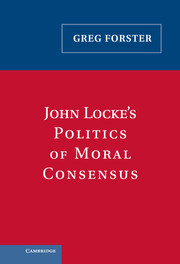Book contents
- Frontmatter
- Contents
- Acknowledgments
- List of Abbreviations
- John Locke's Politics of Moral Consensus
- 1 “Reason Teaches All Mankind, Who Will But Consult It”: John Locke and Moral Consensus
- 2 “Sit Down in Quiet Ignorance”: Locke's Epistemology of Limits
- 3 “The Candle of the Lord”: Locke's Rational Faith
- 4 “The Only Foundation of Faith”: Reasonable Christianity
- 5 “The Only True Touchstone of Moral Rectitude”: The Religious Foundations of Morality
- 6 “'Tis Reasonable to Think the Cause Is Natural”: Locke's Religious Eudemonism
- 7 “The Servants of One Sovereign Master”: Authority and Moral Consensus
- 8 “The Opinion of This or That Philosopher Was of No Authority”: Locke and Us
- Notes
- Bibliography
- Index
1 - “Reason Teaches All Mankind, Who Will But Consult It”: John Locke and Moral Consensus
Published online by Cambridge University Press: 17 August 2009
- Frontmatter
- Contents
- Acknowledgments
- List of Abbreviations
- John Locke's Politics of Moral Consensus
- 1 “Reason Teaches All Mankind, Who Will But Consult It”: John Locke and Moral Consensus
- 2 “Sit Down in Quiet Ignorance”: Locke's Epistemology of Limits
- 3 “The Candle of the Lord”: Locke's Rational Faith
- 4 “The Only Foundation of Faith”: Reasonable Christianity
- 5 “The Only True Touchstone of Moral Rectitude”: The Religious Foundations of Morality
- 6 “'Tis Reasonable to Think the Cause Is Natural”: Locke's Religious Eudemonism
- 7 “The Servants of One Sovereign Master”: Authority and Moral Consensus
- 8 “The Opinion of This or That Philosopher Was of No Authority”: Locke and Us
- Notes
- Bibliography
- Index
Summary
Western liberalism has come full circle. It was born when members of western societies gradually learned, over the course of the sixteenth and seventeenth centuries, to tame their violent religious fanaticisms and coexist as members of shared political communities. This accomplishment was so successful that fundamental moral disagreement and religious violence became steadily less threatening to society, and various other types of problems moved to the top of the theoretical agenda. Liberal political theory became less and less involved with what was, historically, its foundational concern: getting members of different religions to live together in peace. The subject gradually receded into the far corners of liberal consciousness, and as the study of liberalism's founders came to reflect this change, the portions of their works dealing with religion and religious violence were increasingly either ignored or skimmed over even by most scholarly specialists.
Now the circle has closed, and in a very real sense we are back where we started. Violent religious fanaticism and fundamental moral discord threaten the legitimacy and even the very existence of liberal societies. Liberal theorists are failing to cope with these challenges adequately because their longstanding neglect of moral and religious problems has left them unfamiliar with the basic philosophical concepts that once helped them better understand religious belief and moral law, and hence the intricate relationship between religion, morality, and politics.
- Type
- Chapter
- Information
- John Locke's Politics of Moral Consensus , pp. 1 - 39Publisher: Cambridge University PressPrint publication year: 2005

